Engine Citroen JUMPY 2011 2.G Owner's Manual
[x] Cancel search | Manufacturer: CITROEN, Model Year: 2011, Model line: JUMPY, Model: Citroen JUMPY 2011 2.GPages: 260, PDF Size: 9.5 MB
Page 5 of 260
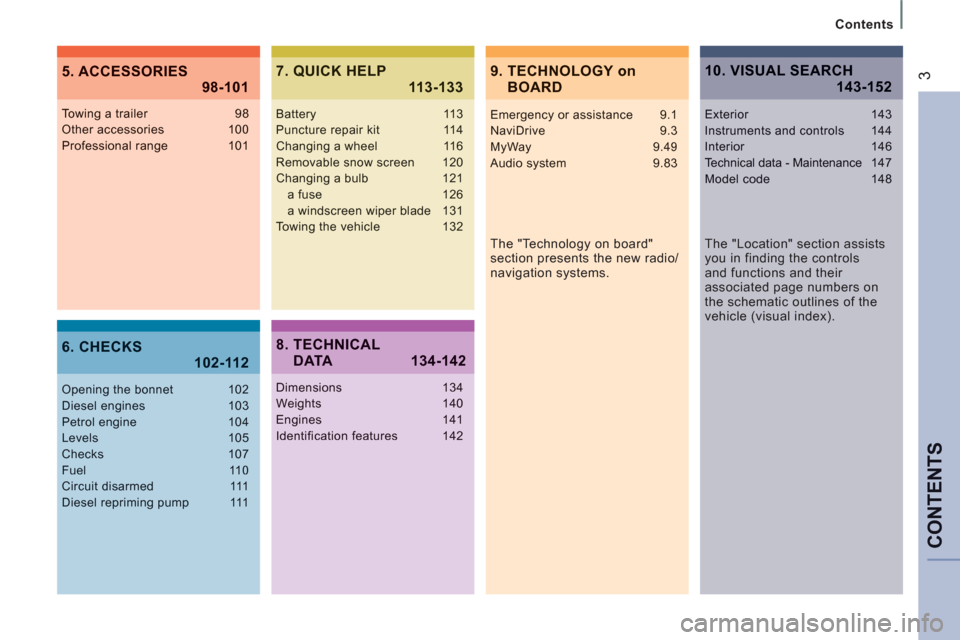
CONTENT
S
Contents
39. TECHNOLOGY onBOARD 5. ACCESSORIES
98-101
6. CHECKS 102-112
7. QUICK HELP 113-133
The "Technology on board"
section presents the new radio/
navigation systems.
Towing a trailer 98Other accessories 100Professional range 101
Opening the bonnet 102Diesel engines 103Petrol engine 104Levels 105Checks 107Fuel 110Circuit disarmed 111Diesel repriming pump 111
Battery 113Puncture repair kit 114Changing a wheel 116Removable snow screen 120Changing a bulb 121a fuse 126a windscreen wiper blade 131
Towing the vehicle 132
8. TECHNICAL DATA 134-142
Dimensions 134Weights 140Engines 141Identification features 142
10. VISUAL SEARCH 143-152
Emergency or assistance 9.1NaviDrive 9.3MyWay 9.49
Audio system 9.83
The "Location" section assists
you in finding the controls
and functions and their
associated page numbers on
the schematic outlines of the
vehicle (visual index).
Exterior 143Instruments and controls 144Interior 146Technical data - Maintenance147Model code 148
Page 9 of 260
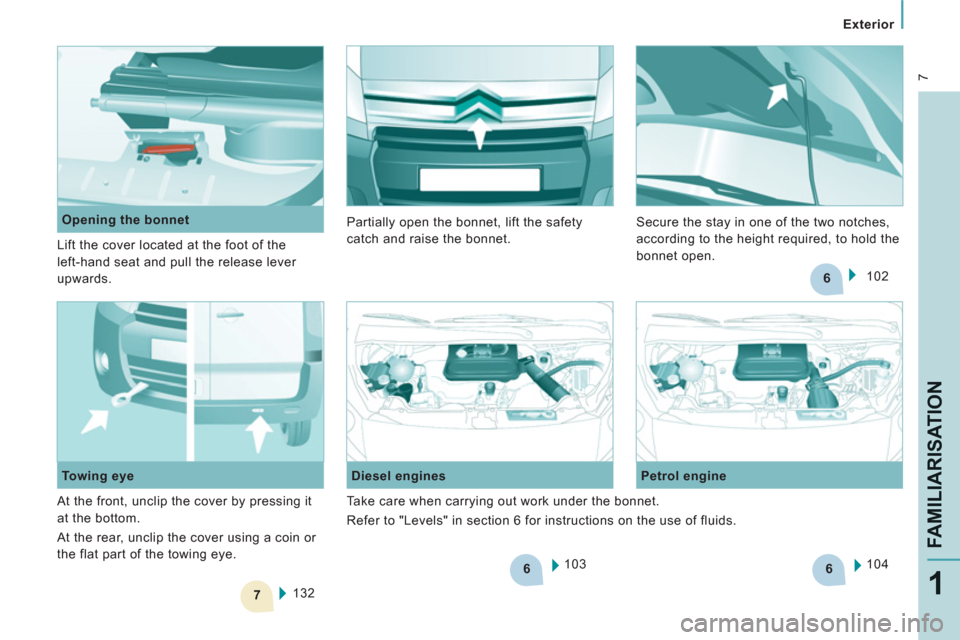
6
7
6
6
7
Exterior
FAMILIARISATIO
N
1
103
Diesel engines
Petrol engine
104
132
Towing eye
Opening the bonnet
Lift the cover located at the foot of the
left-hand seat and pull the release lever
upwards.
At the front, unclip the cover by pressing it
at the bottom.
At the rear, unclip the cover using a coin or
the flat part of the towing eye. 102 Partially open the bonnet, lift the safety
catch and raise the bonnet. Secure the stay in one of the two notches,
according to the height required, to hold the
bonnet open.
Take care when carrying out work under the bonnet.
Refer to "Levels" in section 6 for instructions on the use of fluids.
Page 19 of 260
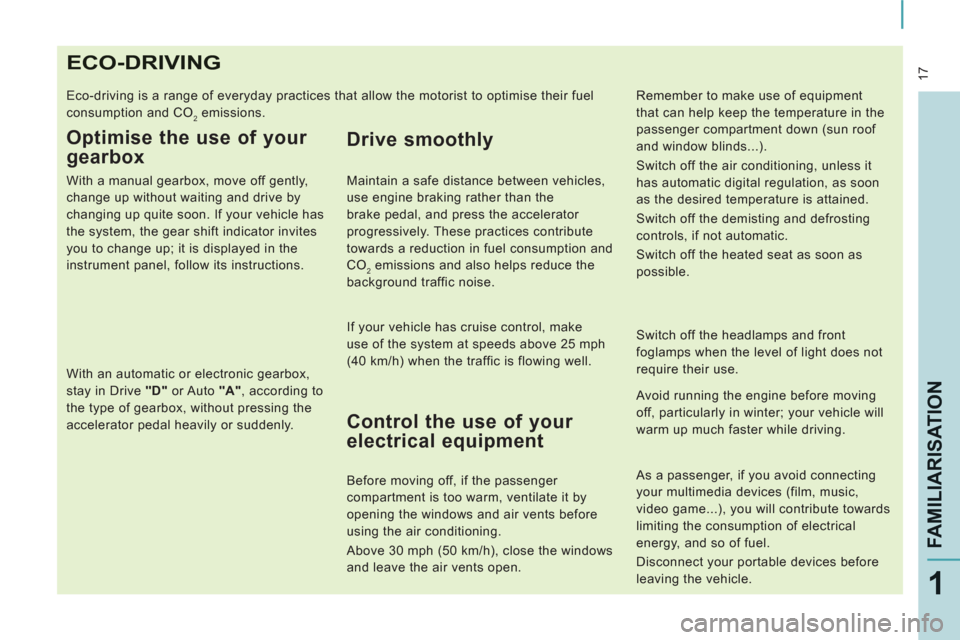
17
FAMILIARISATIO
N
1
ECO-DRIVING
Eco-driving is a range of everyday practices that allow the motorist to optimise their fuel
consumption and CO
2 emissions.
Optimise the use of your
gearbox
With a manual gearbox, move off gently,
change up without waiting and drive by
changing up quite soon. If your vehicle has
the system, the gear shift indicator invites
you to change up; it is displayed in the
instrument panel, follow its instructions.
With an automatic or electronic gearbox,
stay in Drive "D"
or Auto "A"
, according to
the type of gearbox, without pressing the
accelerator pedal heavily or suddenly.
Control the use of your
electrical equipment
Before moving off, if the passenger
compartment is too warm, ventilate it by
opening the windows and air vents before
using the air conditioning.
Above 30 mph (50 km/h), close the windows
and leave the air vents open.
Switch off the headlamps and front
foglamps when the level of light does not
require their use.
Avoid running the engine before moving
off, particularly in winter; your vehicle will
warm up much faster while driving.
Drive smoothly
Maintain a safe distance between vehicles,
use engine braking rather than the
brake pedal, and press the accelerator
progressively. These practices contribute
towards a reduction in fuel consumption and
CO
2 emissions and also helps reduce the
background traffic noise.
If your vehicle has cruise control, make
use of the system at speeds above 25 mph
(40 km/h) when the traffic is flowing well.
As a passenger, if you avoid connecting
your multimedia devices (film, music,
video game...), you will contribute towards
limiting the consumption of electrical
energy, and so of fuel.
Disconnect your portable devices before
leaving the vehicle.
Remember to make use of equipment
that can help keep the temperature in the
passenger compartment down (sun roof
and window blinds...).
Switch off the air conditioning, unless it
has automatic digital regulation, as soon
as the desired temperature is attained.
Switch off the demisting and defrosting
controls, if not automatic.
Switch off the heated seat as soon as
possible.
Page 20 of 260
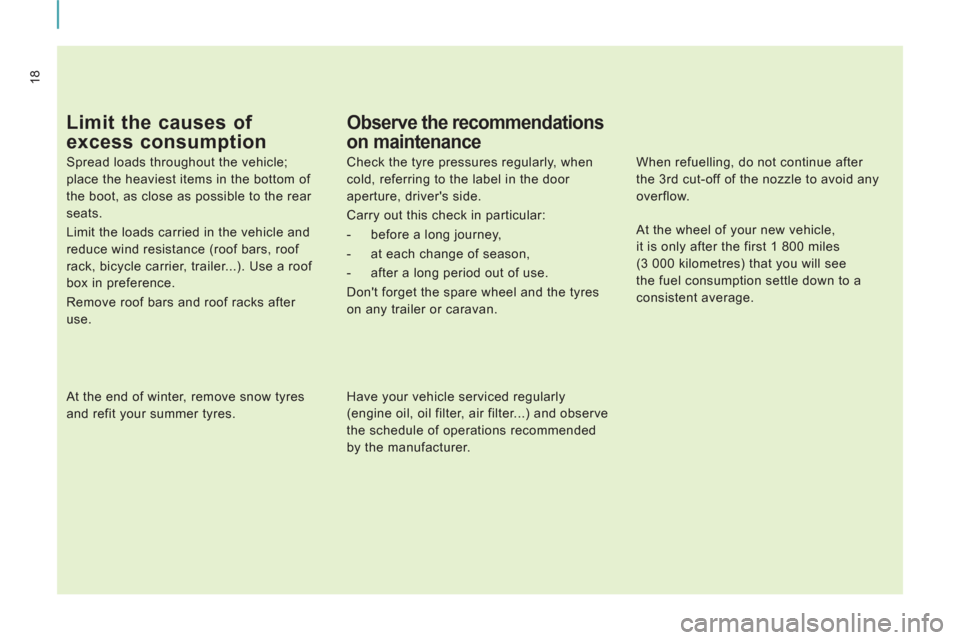
18
Limit the causes of
excess consumption
Spread loads throughout the vehicle;
place the heaviest items in the bottom of
the boot, as close as possible to the rear
seats.
Limit the loads carried in the vehicle and
reduce wind resistance (roof bars, roof
rack, bicycle carrier, trailer...). Use a roof
box in preference.
Remove roof bars and roof racks after
use.
At the end of winter, remove snow tyres
and refit your summer tyres.
Observe the recommendations
on maintenance
Check the tyre pressures regularly, when
cold, referring to the label in the door
aperture, driver's side.
Carry out this check in particular:
- before a long journey,
- at each change of season,
- after a long period out of use.
Don't forget the spare wheel and the tyres
on any trailer or caravan.
Have your vehicle serviced regularly
(engine oil, oil filter, air filter...) and observe
the schedule of operations recommended
by the manufacturer.
When refuelling, do not continue after
the 3 rd cut-off of the nozzle to avoid any
overflow.
At the wheel of your new vehicle,
it is only after the first 1 800 miles
(3 000 kilometres) that you will see
the fuel consumption settle down to a
consistent average.
Page 22 of 260
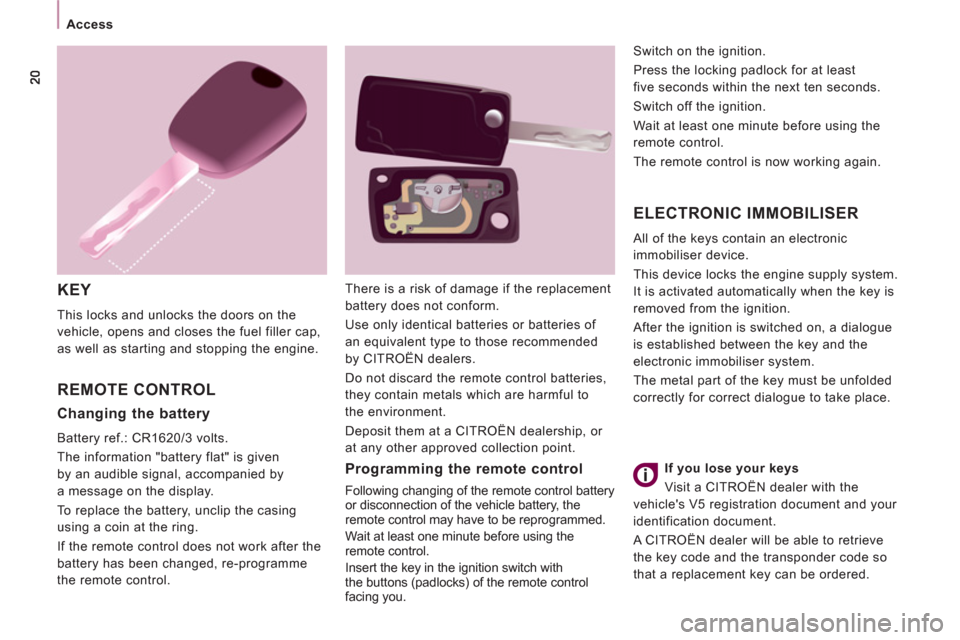
Access
KEY
This locks and unlocks the doors on the
vehicle, opens and closes the fuel filler cap,
as well as starting and stopping the engine.
REMOTE CONTROL ELECTRONIC IMMOBILISER
All of the keys contain an electronic
immobiliser device.
This device locks the engine supply system.
It is activated automatically when the key is
removed from the ignition.
After the ignition is switched on, a dialogue
is established between the key and the
electronic immobiliser system.
The metal part of the key must be unfolded
correctly for correct dialogue to take place.
Programming the remote control
Following changing of the remote control battery
or disconnection of the vehicle battery, the
remote control may have to be reprogrammed.
Wait at least one minute before using the
remote control.
Insert the key in the ignition switch with
the buttons (padlocks) of the remote control
facing you. Switch on the ignition.
Press the locking padlock for at least
five seconds within the next ten seconds.
Switch off the ignition.
Wait at least one minute before using the
remote control.
The remote control is now working again.
There is a risk of damage if the replacement
battery does not conform.
Use only identical batteries or batteries of
an equivalent type to those recommended
by CITROËN dealers.
Do not discard the remote control batteries,
they contain metals which are harmful to
the environment.
Deposit them at a CITROËN dealership, or
at any other approved collection point.
Changing the battery
Battery ref.: CR1620/3 volts.
The information "battery flat" is given
by an audible signal, accompanied by
a message on the display.
To replace the battery, unclip the casing
using a coin at the ring.
If the remote control does not work after the
battery has been changed, re-programme
the remote control.
If you lose your keys
Visit a CITROËN dealer with the
vehicle's V5 registration document and your
identification document.
A CITROËN dealer will be able to retrieve
the key code and the transponder code so
that a replacement key can be ordered.
Page 25 of 260
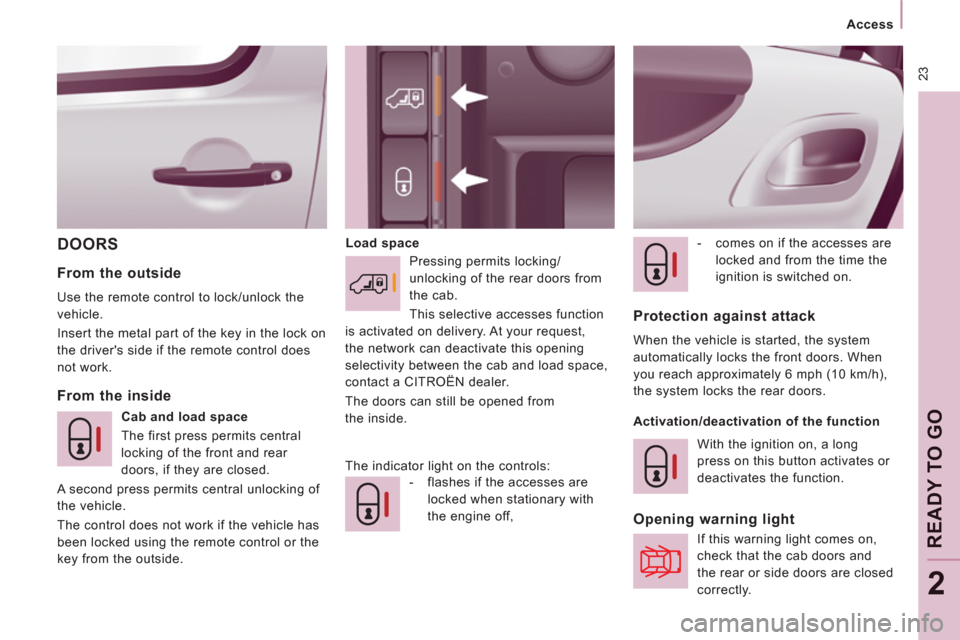
23
Access
READY TO GO
2
DOORS
Load space
- comes on if the accesses are
locked and from the time the
ignition is switched on.
From the inside
From the outside
Use the remote control to lock/unlock the
vehicle.
Insert the metal part of the key in the lock on
the driver's side if the remote control does
not work.
Cab and load space
The first press permits central
locking of the front and rear
doors, if they are closed.
A second press permits central unlocking of
the vehicle.
The control does not work if the vehicle has
been locked using the remote control or the
key from the outside. Pressing permits locking/
unlocking of the rear doors from
the cab.
This selective accesses function
is activated on delivery. At your request,
the network can deactivate this opening
selectivity between the cab and load space,
contact a CITROËN dealer.
The doors can still be opened from
the inside.
The indicator light on the controls:
Protection against attack
When the vehicle is started, the system
automatically locks the front doors. When
you reach approximately 6 mph (10 km/h),
the system locks the rear doors.
Activation/deactivation of the function
With the ignition on, a long
press on this button activates or
deactivates the function.
Opening warning light
If this warning light comes on,
check that the cab doors and
the rear or side doors are closed
correctly.
- flashes if the accesses are
locked when stationary with
the engine off,
Page 28 of 260
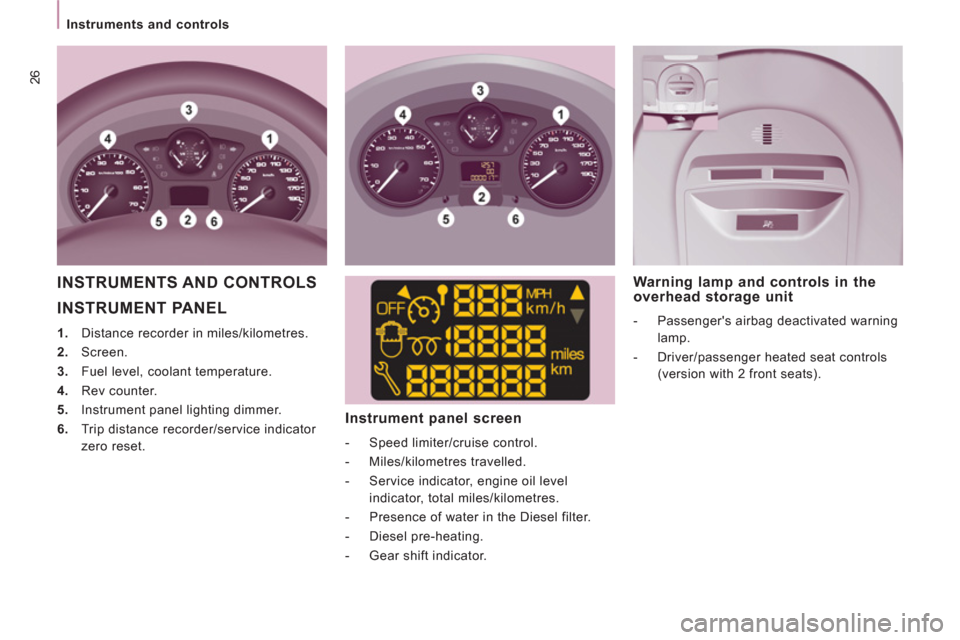
26
Instruments and controls
INSTRUMENT PANEL
1.
Distance recorder in miles/kilometres.
2.
Screen.
3.
Fuel level, coolant temperature.
4.
Rev counter.
5.
Instrument panel lighting dimmer.
6.
Trip distance recorder/service indicator
zero reset.
Instrument panel screen
- Speed limiter/cruise control.
- Miles/kilometres travelled.
- Service indicator, engine oil level
indicator, total miles/kilometres.
- Presence of water in the Diesel filter.
- Diesel pre-heating.
- Gear shift indicator.
Warning lamp and controls in the
overhead storage unit
- Passenger's airbag deactivated warning
lamp.
- Driver/passenger heated seat controls
(version with 2 front seats).
INSTRUMENTS AND CONTROLS
Page 30 of 260
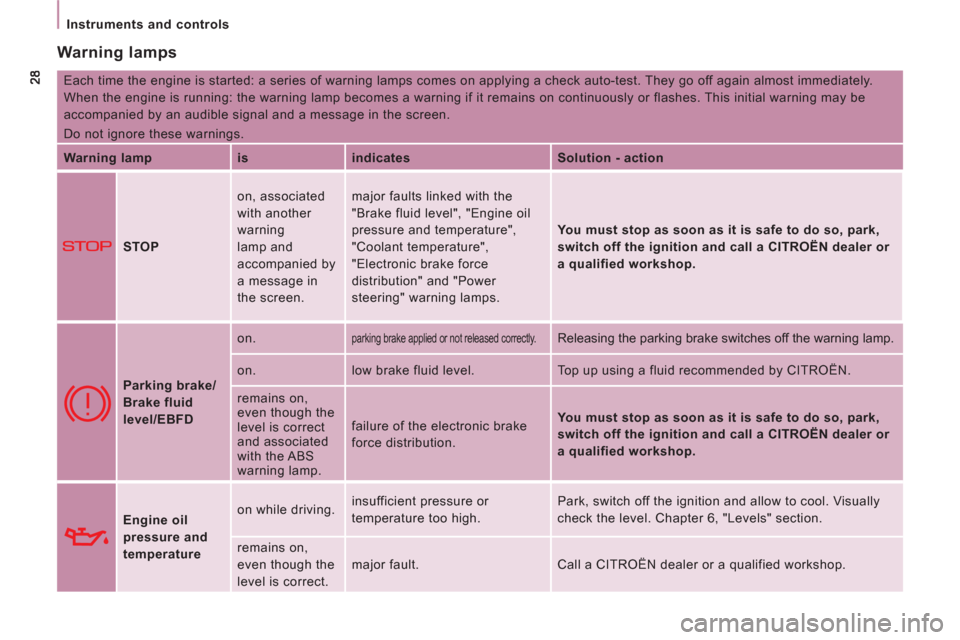
Instruments and controls
Warning lamps
Each time the engine is started: a series of warning lamps comes on applying a check auto-test. They go off again almost immediately.
When the engine is running: the warning lamp becomes a warning if it remains on continuously or flashes. This initial warning may be
accompanied by an audible signal and a message in the screen.
Do not ignore these warnings.
Warning lamp
is
indicates
Solution - action
STOP on, associated
with another
warning
lamp and
accompanied by
a message in
the screen. major faults linked with the
"Brake fluid level", "Engine oil
pressure and temperature",
"Coolant temperature",
"Electronic brake force
distribution" and "Power
steering" warning lamps.
You must stop as soon as it is safe to do so, park,
switch off the ignition and call a CITROËN dealer or
a qualified workshop.
Parking brake/
Brake fluid
level/EBFD on.
parking brake applied or not released correctly.
Releasing the parking brake switches off the warning lamp.
on. low brake fluid level. Top up using a fluid recommended by CITROËN.
remains on,
even though the
level is correct
and associated
with the ABS
warning lamp. failure of the electronic brake
force distribution.
You must stop as soon as it is safe to do so, park,
switch off the ignition and call a
CITROËN dealer or
a qualified workshop.
Engine oil
pressure and
temperature on while driving. insufficient pressure or
temperature too high. Park, switch off the ignition and allow to cool. Visually
check the level. Chapter 6, "Levels" section.
remains on,
even though the
level is correct. major fault. Call a CITROËN dealer or a qualified workshop.
Page 36 of 260
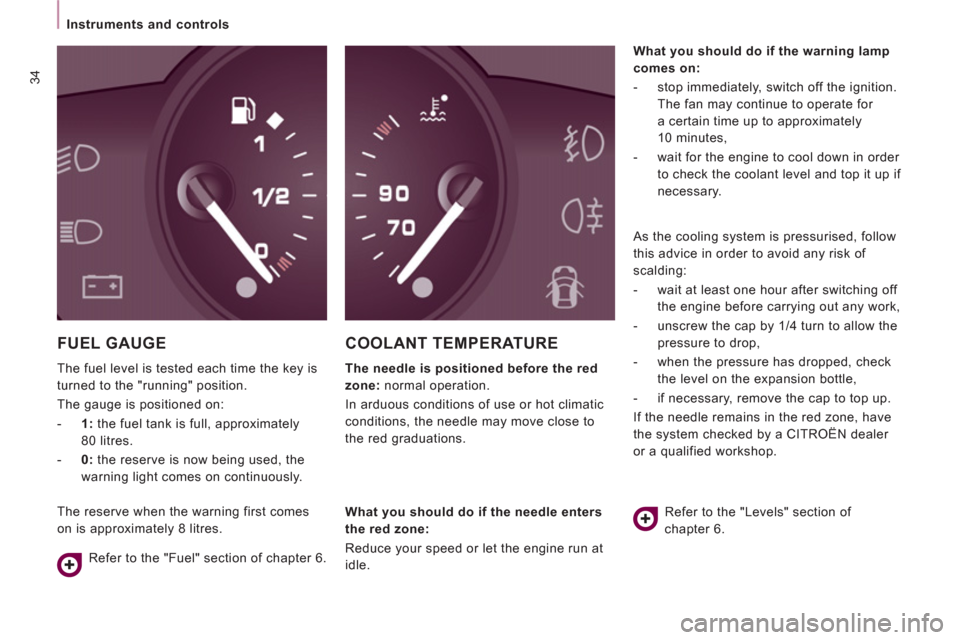
34
Instruments and controls
FUEL GAUGE
The fuel level is tested each time the key is
turned to the "running" position.
The gauge is positioned on:
- 1:
the fuel tank is full, approximately
80 litres.
- 0:
the reserve is now being used, the
warning light comes on continuously.
COOLANT TEMPERATURE
The needle is positioned before the red
zone:
normal operation.
In arduous conditions of use or hot climatic
conditions, the needle may move close to
the red graduations.
What you should do if the warning lamp
comes on:
- stop immediately, switch off the ignition.
The fan may continue to operate for
a certain time up to approximately
10 minutes,
- wait for the engine to cool down in order
to check the coolant level and top it up if
necessary.
Refer to the "Fuel" section of chapter 6.
What you should do if the needle enters
the red zone:
Reduce your speed or let the engine run at
idle. Refer to the "Levels" section of
chapter 6. The reserve when the warning first comes
on is approximately 8 litres. As the cooling system is pressurised, follow
this advice in order to avoid any risk of
scalding:
- wait at least one hour after switching off
the engine before carrying out any work,
- unscrew the cap by 1/4 turn to allow the
pressure to drop,
- when the pressure has dropped, check
the level on the expansion bottle,
- if necessary, remove the cap to top up.
If the needle remains in the red zone, have
the system checked by a CITROËN dealer
or a qualified workshop.
Page 37 of 260
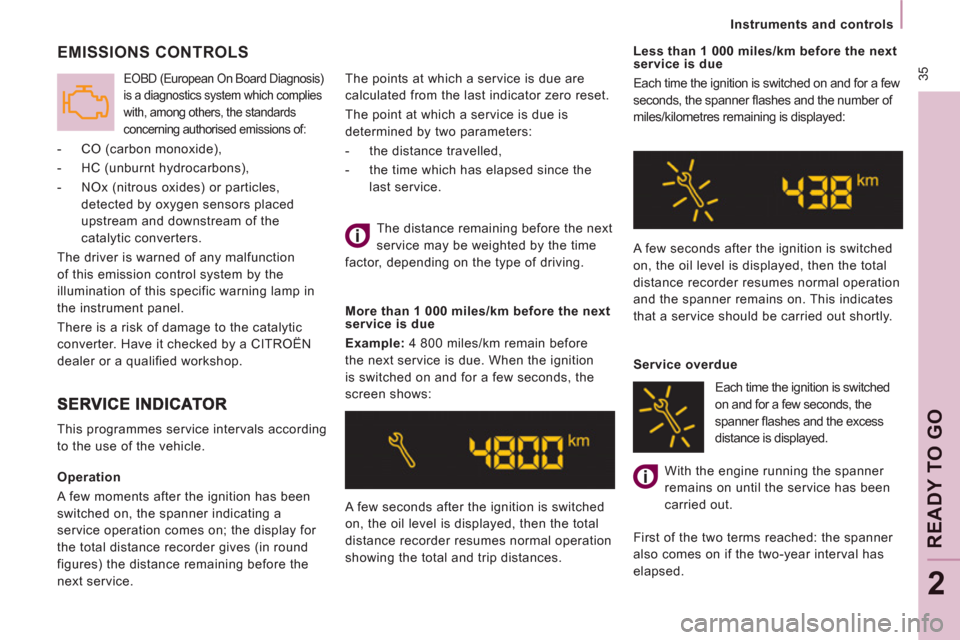
35
Instruments and controls
READY TO GO
2
Operation
A few moments after the ignition has been
switched on, the spanner indicating a
service operation comes on; the display for
the total distance recorder gives (in round
figures) the distance remaining before the
next service. A few seconds after the ignition is switched
on, the oil level is displayed, then the total
distance recorder resumes normal operation
showing the total and trip distances.
Less than 1 000 miles/km before the next
service is due
Each time the ignition is switched on and for a few
seconds, the spanner fl ashes and the number of
miles/kilometres remaining is displayed:
A few seconds after the ignition is switched
on, the oil level is displayed, then the total
distance recorder resumes normal operation
and the spanner remains on. This indicates
that a service should be carried out shortly.
Service overdue
With the engine running the spanner
remains on until the service has been
carried out.
First of the two terms reached: the spanner
also comes on if the two-year interval has
elapsed.
The distance remaining before the next
service may be weighted by the time
factor, depending on the type of driving.
More than 1 000 miles/km before the next
service is due
Example:
4 800 miles/km remain before
the next service is due. When the ignition
is switched on and for a few seconds, the
screen shows:
This programmes service intervals according
to the use of the vehicle.
EMISSIONS CONTROLS
- CO (carbon monoxide),
- HC (unburnt hydrocarbons),
- NOx (nitrous oxides) or particles,
detected by oxygen sensors placed
upstream and downstream of the
catalytic converters.
The driver is warned of any malfunction
of this emission control system by the
illumination of this specific warning lamp in
the instrument panel.
There is a risk of damage to the catalytic
converter. Have it checked by a CITROËN
dealer or a qualified workshop.
EOBD (European On Board Diagnosis)
is a diagnostics system which complies
with, among others, the standards
concerning authorised emissions of:
Each time the ignition is switched
on and for a few seconds, the
spanner fl ashes and the excess
distance is displayed. The points at which a service is due are
calculated from the last indicator zero reset.
The point at which a service is due is
determined by two parameters:
- the distance travelled,
- the time which has elapsed since the
last service.